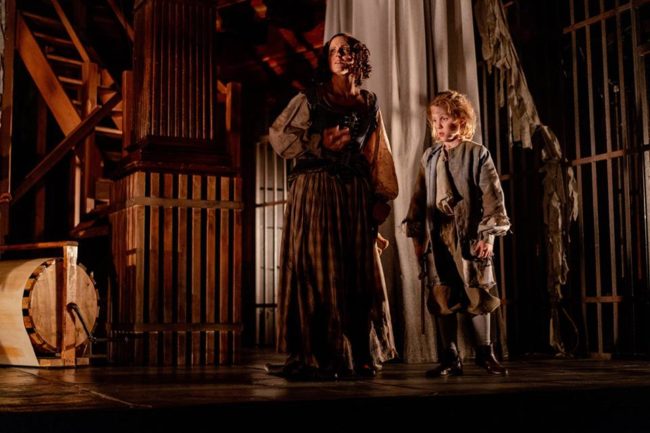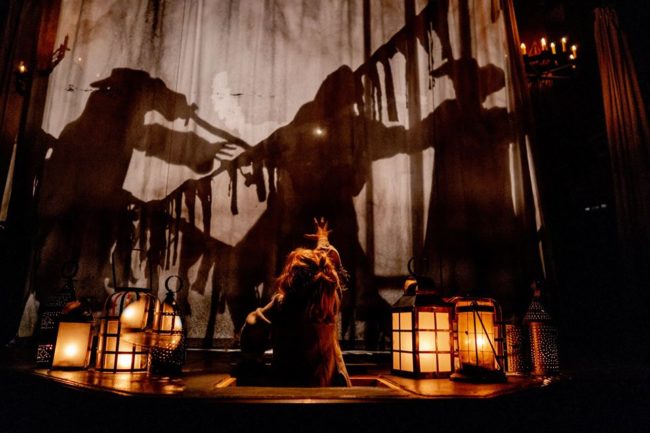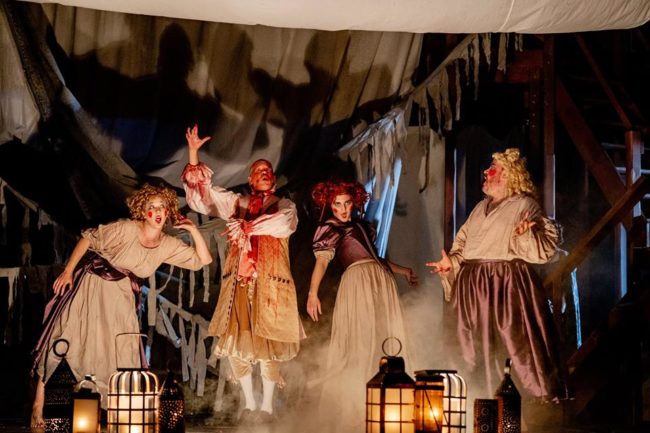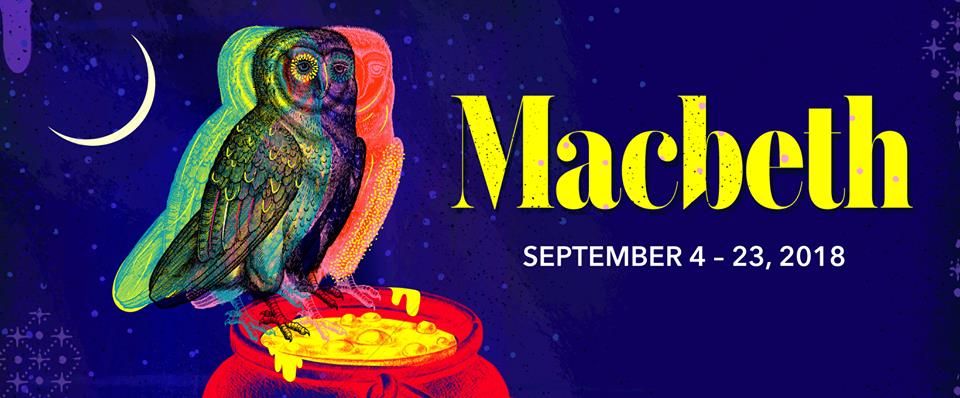Macbeth at the Folger Theatre is unlike any production you will have seen before. That’s a guarantee the Folger can make as they stage for the first time since its origination Macbeth by William Davenant, a Restoration-era adaptation of Shakespeare’s text. Director Robert Richmond, in a collaboration with scholars and the Folger Consort musicians, presents a production that is the result of years of research and work to present something unseen by a modern audience.
Following the English Civil War, theater was just coming alive again, and, as the Folger explains, “as few new plays were immediately available, the theaters turned to old classics – including Shakespeare – revising these texts to reflect current fashion.” The plot and characters well-known to Macbeth are all still there in Davenant’s revision, but with additions: Lady Macduff and Lady Macbeth share an exchange about their husbands, Macduff has more than one motive for his actions, and the ever-present witches sing and dance in new musical pieces.

It is difficult not to be struck by this production from the moment you set foot in the theater. The Folger Consort is an exquisite group of performers, and their music from the stage’s balcony, as led by Music Director Robert Eisenstein, is a performance unto itself. Likewise, the traditional stage of the Folger has been transformed to reflect the production’s setting of Bedlam Asylum, stocked with locked cells, tattered attempts at stage decoration, and stunning floor-level lighting (from Lighting Designer Andrew F. Griffin.) However, the piped in smoke effects, while adding ambiance, did not seem to actually fit the setting and served more to create a smell than a point.
The performances featured in this production are worth your ticket price alone. Ian Merrill Peakes as the title character is a masterclass in acting, and his skill is most intensely captured in moments of stillness and soliloquy, where the expressiveness of his eyes and careful breathing bring new life to his lines. Likewise, Karen Peakes in the expanded role of Lady Macduff is an indomitable force of both fear and compassion. Rounding out the leads, Kate Eastwood Norris as Lady Macbeth is compelling, as is Chris Genebach as Macduff, who truly shined at the news of the Macduff family murder. Owen Peakes, son to the aforementioned Ian Merrill and Karen, is terrifying not only as Fleance, but as the spirit of Hecate, with unnerving and precise bird-like movements.
The highlights, however, were the three witches, as played by Rachel Montgomery, Emily Noel, and Ethan Watermeier. Not only were their performances unsettling and unmissable, but their musical interludes, courtesy of Davenant, were wholly new and impressive, creating the single most powerful moment of the show as the sang and danced with the puppeted corpse of Duncan, gashes still visible in his coat (one of many brilliant designs from Costume Designer Mariah Anzaldo Hale.)

Where this production falters, however, is its determination to present two plays at once. In the words of Director Robert Richmond, “The concept for this production is a play within a play – a one-time performance staged as a fundraising event for Bedlam, the mental asylum in London, two weeks after the Great Fire in 1666.” However, the murder of King Duncan, played by the asylum’s warden (Louis Butelli), is a real crime carried out by the inmates. “From this point on,” says Richmond, “the acting is rooted in realism and more kin to 21st-century performances of this play.” Characters, who had once been inmates struggling to remember their lines, were now fully realized performances of their character, and what is effectively a new play begins, almost completely abandoning the prior pretense. Almost, that is, as, despite this shift, characters occasionally drift back into the confines of their cells, or returning for the final speech to the horrors of the asylum, never wholly committing to the new conceit. Meanwhile, while the first handful of scenes are meant to be a presented play, the production still fails to commit to that conceit as well, depicting scenes of torture and daily asylum life in the background of other scenes or having actors enter from the house.

The Folger has taken on an incredibly exciting project by staging Daveant’s Macbeth, setting out to combine the work of historians, actors, designers, and musicians to present something unique and new to Shakespeare scholars and casual viewers alike. And while confusion and ambiguity are things to be embraced when staging Macbeth, the production ultimately gets tangled in its own inability to choose one conceit – a resurrected adaptation of Macbeth as it would take place in an asylum – over another – an original practices performance of Restoration Shakespeare as performed by asylum inmates.
This production is unmissable. There is no more efficient way to state it than that. Never before, to Folger’s knowledge, has Davenant’s Macbeth been staged, and it is unlikely to be a popular choice in the future given that precedent. The opportunity to experience not only a stunning production, but a once-in-a-lifetime chance to experience Restoration English theater as it might have been, cannot be passed up.
Running Time: 2 hours and 45 minutes with one intermission
Macbeth plays through September 23, 2018 at the Folger Theatre in the Folger Shakespeare Library— 201 E. Capitol Street SE in Washington DC. For tickets call the box office at (202) 544-7077 or purchase them online.

